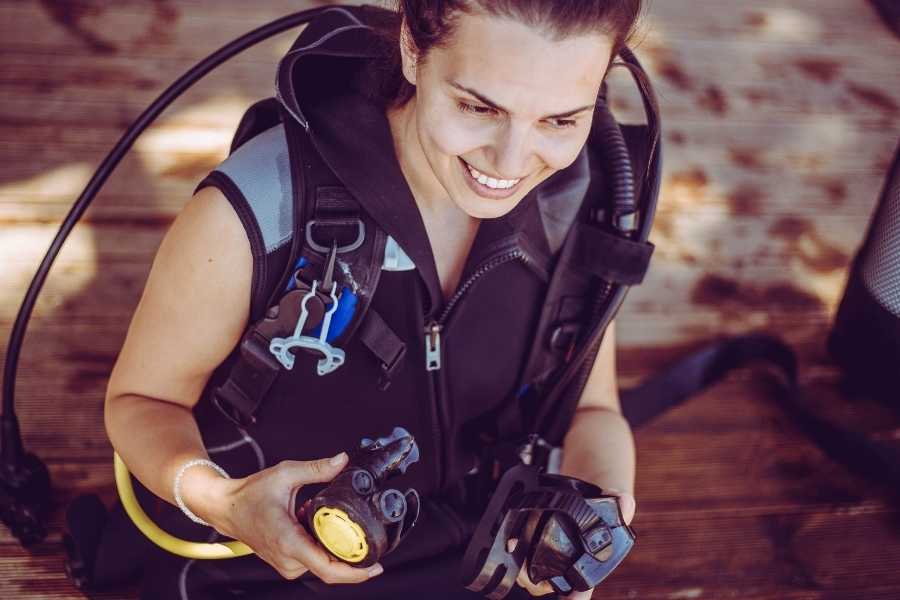During my years working as a diving instructor I’ve had many people comment to me about how lucky I am and how it must be the dream job. And I usually respond with a smile and agree that, yes, I’m lucky to be in a beautiful place, doing something I love, and most of the time it is a dream job!
But there’s a lot more to it than luck and fun. Yes; I was lucky to be born in a country where I could earn enough money to set off abroad in the first place and be able to pay for all my diving training. However, anyone in a similar position, with good health, a little bit of money behind them, and not too many responsibilities can do it. When it comes to being the ‘dream job’ at times it definitely is. However, there’s a lot of hard work involved too.
Regular Day As Dive Instructor
So, what does a regular day as a diving instructor entail? Well for a start, there is no such thing as a regular day! The nature of the business means that you never know what to expect from one morning to the next. The weather can suddenly change, last-minute customers might turn up, others may cancel, there could be a problem with the boat, or a lack of tanks, not enough equipment, or a hundred other things. Even when you think you know what the day is going to bring, it could all change at the last minute. And for that reason, some of the most important qualities a driving instructor can have are flexibility and versatility, as well as a good friendly attitude.
In regard to the diving sides of things, you’ll be teaching brand new divers as well as conducting advanced courses, and also taking certified divers out on fun dives. The most popular courses are the Discover Scuba Diving (DSD) course, the Open Water (OW) course, and the Advanced Open Water (AOW) course. You’ll be expected to teach the theoretical aspects of the course, including going through the course material, putting on videos for the students to watch, and marking knowledge reviews, quizzes, and exams. So, it’s important to be on top of all the theories yourself in order to explain points your students might be confused about.
The DSD and OW courses include confined water sessions, where you’ll take your students to the pool, carry all the equipment and tanks, and set it all up with them, checking they have the right sizes of equipment and are happy with the masks, fins, etc. You’ll go over the skills you’re going to do with them, explaining the techniques, and also why each skill is important. Finally, you’ll get into the pool, demonstrate the skills, and make sure that your students can perform them to a good standard, even if it means repeating them several times.

Often if you have a pool session in the morning, you’ll be diving with the same customers in the afternoon. So that means waving them off for their nice hotel lunch while you take back all the equipment, organize it for the afternoon dive, and then maybe grab a quick break for lunch yourself before carrying everything to the boat for the afternoon dives. When your students return, you’ll show them where their gear is, and get them to set it up on the boat. Then you’ll give them a boat briefing with some safety information and a dive briefing where you’ll tell them about any skills they need to demonstrate, go through hand signals, tell them about the dive site, etc.
If you’re taking out certified divers who are just diving for fun, you’ll want to talk to them before the dive to find out how experienced they are and when the last time they dived was. You’ll usually set up their equipment on the boat for them, and then give a boat and dive briefing, focusing more on what they can expect to see, depending on their experience and where they have dived before. It’s important to have a good knowledge of the local reefs and also the kinds of coral, fish, and underwater creatures you can expect to find there so you can pass on this information to your clients as often you’ll get lots of questions asked.
During the dives, you’ll usually be at the front of the group, and you might have a Dive Master at the back to help manage the group. For DSD and OW students you’ll need to keep really close to the students as their buoyancy is likely to be a little erratic at first and you might need to make a swoop for them and pull them down if suddenly start popping up. It can be really dangerous to ascend too fast, and also to surface without making a safety stop or inflating a surface marker buoy, so it’s important to keep a close eye on new divers at all times.
Even with certified divers, you never know what standard you’re going to get, and sometimes the cocky guy with the huge camera who says he has way more dives than you can actually be the worst diver of the group. Therefore, you always need to be attentive, whoever you’re taking. There are plenty of things that can go wrong under the water and also on the boat, but part of being a diving instructor is to deal with everything as smoothly as possible. You should make sure you have a good diving insurance policy for the odd occasion when something might go wrong. But of course, part of your duty is to be quick on your toes and have your wits about you to ensure nothing does go wrong by recognising, reacting to, and dealing with potential problems before they even arise.
And there’s a lot more to being a diving instructor than just diving. When back at the shop you’ll look after your customers until they leave, signing logbooks and probably giving bar and restaurant recommendations. Then you’ll rinse and hang up all their equipment, as well as your own. Before you head home you should make sure that any paperwork is completed if you’ve been doing any courses.
Many Facets
There are many facets to a diving instructors job and any of the following may be tasks you’re required to do, depending on the dive shop you are working for:
- Teaching courses and guiding certified divers
- Selling in the shop or by the pool
- Conducting pool demo sessions
- Cleaning, tidying, sweeping, and mopping
- Preparing, rinsing, hanging up, and repairing equipment
- Carrying tanks and equipment between various places
- Filling tanks
- Transporting customers to and from their hotel
- Running errands, e.g. picking up gas for the boat
The above are all skills that can be taught so you shouldn’t be put off if you feel inexperienced; the following skills are much more important and will be far more valued by dive shops:
- Having a great attitude
- Being prepared to work hard
- Turning up on time and in good form
- Being open-minded and willing to muck in with whatever problem or task might present itself
- Able to look after customers professionally, kindly, and safely
- Willing to learn
Working as a diving instructor is really fun and anyone who loves diving should definitely consider it. However, it’s also tiring, hard work, and involves long hours. When you’re looking after people underwater you have a lot of responsibility and when you have a big group of inexperienced divers, it can get pretty stressful. On a choppy day, you’ll likely have people feeling unwell on the boat or in the water, and some days you’ll just get downright rudeness. However, mostly you’ll get relaxed and good divers, beautiful days, and the opportunity to really enjoy the dive and point out some interesting species to your clients.
With regards to salary it varies a lot – from country to country and from dive shop to dive shop – but generally speaking, you’re not going to have much left to play with after paying the rent and bills. However, when you’re in a beautiful place, in and out of the ocean every day, and your daily uniform is a wetsuit, you don’t really need much more anyway.

To Sum It Up
The good, the bad, and the ugly of being a diving instructor, summed up:
+ Working in a beautiful sunny warm environment (most of the time, and depending on where you choose to get a job!)
+ Getting to meet people from all over the world
+ Diving every day and sharing your love of diving with other people
+ Seeing the joy on people’s faces the first time they experience the underwater world
+ Being active and not having to sit behind a desk every day
+ Becoming a more experienced diver and learning new things every day
+ Increasing your knowledge of the ocean and its inhabitants
– Tiring work, especially in high season and/or busy periods
– Dealing with the odd difficult or rude customer
– Having to dive even when the weather is cold and miserable
– Getting ear problems (inevitable when you spend so much time in and out of the water)
– Receiving a small salary
For me, the good points far outweigh the bad but I would say one thing to anyone thinking about taking the plunge themselves: as long as diving is your passion and you’re willing to work hard, you’re not going to regret your decision to become a diving instructor!


















